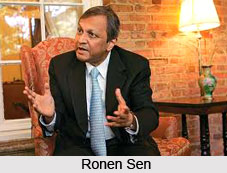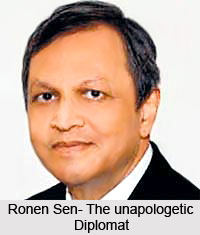Ranendra "Ronen" Sen (born April 9, 1944) was India`s ambassador to the United States of America from August 2004 to March 2009. His contribution landmark US India Nuclear deal is considered of immense importance.
Ronen Sen is one of India`s most seasoned diplomats. He was an ambassador in Moscow, ambassador in Washington, High Commissioner in UK and ambassador in Berlin, all at crucial times during India`s relationship with the governments there. A career diplomat, for 43 years he seriously avoided the media which got himself in a little bit of controversy when he made a statement about headless chickens. He was censored by Parliament, unfairly so because he later told us that he meant journalists and not Parliament.
 Career of Ronen Sen
Career of Ronen Sen
After his graduation from St. Xavier`s College, Kolkata, Sen joined the Indian Foreign Service in July 1966. From 1968 to 1984, he served in Indian missions/posts in Moscow, San Francisco and in Dhaka and in the Ministry of External Affairs. He has also been Secretary to the Atomic Energy Commission of India.
From July 1984 to December 1985, Ronen Sen was Joint Secretary in the Ministry of External Affairs. Thereafter he was Joint Secretary to the Prime Minister of India from 1986 to July 1991 responsible for Foreign Affairs, Defence and Science and Technology responsible for foreign and defence policies, atomic energy, space and other tasks, as assigned to Ronen Sen, from time to time by the Prime Minister
Ronen Sen also served as India`s ambassador to Mexico from September 1991 to August 1992; Ambassador of India to Russia from October 1992 to October 1998; India`s ambassador to Germany from October 1998 to May 2002 and High Commissioner to the United Kingdom from May 2002 to April 2004.
Ronen Sen has also participated in summit meetings in the United Nations, Commonwealth, Non-Aligned Movement, Six Nation Five Continent Peace Initiative, SAARC, International Atomic Energy Agency, G-15 and other forums and also in over 160 bilateral summit meetings. He has also served as Special Envoy of the Prime Minister of India several times.
 Contribution of Ronen Sen
Contribution of Ronen Sen
More importantly, he was one of the first Indian diplomats who start using what has now become a common word - economic diplomacy. Ronen Sen was as an industrialist and a person who could tell one in micro detail about investing in a country, investing in a company and investing in people. Some people even call him the first Indian economic diplomat.
Sen has probably seen more contemporary world history up close and personal than many Indian civil servants. A vastly abbreviated version of a CV he`d helpfully sent me reads thus. Served in Indian missions and posts in Moscow, San Francisco (when Ronald Reagan was Governor of California) and Dhaka (when Mujib was assassinated and the Indian mission attacked). Secretary to the Atomic Energy Commission during the Tarapur crisis; he was even the Joint secretary in Rajiv Gandhi`s PMO.
Being the Ambassador to Russia (1992 to 1998) during the "most difficult period of the post-Soviet transition" he was the Last foreign ambassador to present his credentials in Bonn and the first in Berlin as capital of reunified Germany. High Commissioner to the United Kingdom (June 2002 to end April 2004). And there was his post-retirement job as Ambassador to the United States (August 2004 to end March 2009) that set Indo-American relations on a new trajectory.
For all that, he is viscerally disinclined to regale with tales of diplomatic derring-do, though he does reveal a bone-dry, laconic sense of humour. For one, he assures Indians he`s an accidental diplomat. As he observed- "People don`t realise that economic reforms are not just an economic necessity, it is a strategic imperative. You can`t isolate it from our defence preparedness. You can`t isolate it from other time bombs ticking within our own country"
Ronen Sen in actuality in a farsighted view forecasts the economic strategies of the developing country India itself.




















